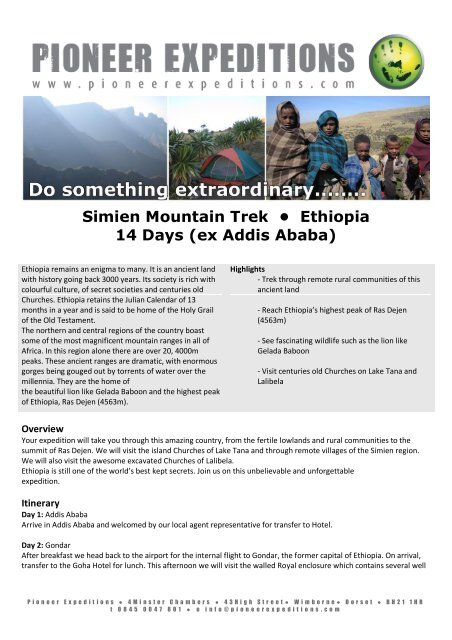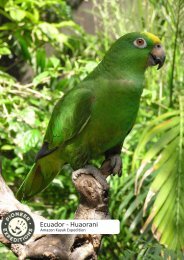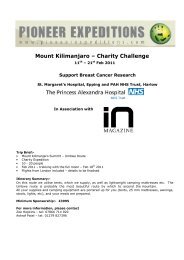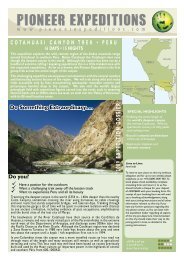Simien Mountain Trek ⢠Ethiopia 14 Days (ex Addis Ababa)
Simien Mountain Trek ⢠Ethiopia 14 Days (ex Addis Ababa)
Simien Mountain Trek ⢠Ethiopia 14 Days (ex Addis Ababa)
You also want an ePaper? Increase the reach of your titles
YUMPU automatically turns print PDFs into web optimized ePapers that Google loves.
<strong>Simien</strong> <strong>Mountain</strong> <strong>Trek</strong> • <strong>Ethiopia</strong><br />
<strong>14</strong> <strong>Days</strong> (<strong>ex</strong> <strong>Addis</strong> <strong>Ababa</strong>)<br />
<strong>Ethiopia</strong> remains an enigma to many. It is an ancient land<br />
with history going back 3000 years. Its society is rich with<br />
colourful culture, of secret societies and centuries old<br />
Churches. <strong>Ethiopia</strong> retains the Julian Calendar of 13<br />
months in a year and is said to be home of the Holy Grail<br />
of the Old Testament.<br />
The northern and central regions of the country boast<br />
some of the most magnificent mountain ranges in all of<br />
Africa. In this region alone there are over 20, 4000m<br />
peaks. These ancient ranges are dramatic, with enormous<br />
gorges being gouged out by torrents of water over the<br />
millennia. They are the home of<br />
the beautiful lion like Gelada Baboon and the highest peak<br />
of <strong>Ethiopia</strong>, Ras Dejen (4563m).<br />
Highlights<br />
- <strong>Trek</strong> through remote rural communities of this<br />
ancient land<br />
- Reach <strong>Ethiopia</strong>’s highest peak of Ras Dejen<br />
(4563m)<br />
- See fascinating wildlife such as the lion like<br />
Gelada Baboon<br />
- Visit centuries old Churches on Lake Tana and<br />
Lalibela<br />
Overview<br />
Your <strong>ex</strong>pedition will take you through this amazing country, from the fertile lowlands and rural communities to the<br />
summit of Ras Dejen. We will visit the island Churches of Lake Tana and through remote villages of the <strong>Simien</strong> region.<br />
We will also visit the awesome <strong>ex</strong>cavated Churches of Lalibela.<br />
<strong>Ethiopia</strong> is still one of the world’s best kept secrets. Join us on this unbelievable and unforgettable<br />
<strong>ex</strong>pedition.<br />
Itinerary<br />
Day 1: <strong>Addis</strong> <strong>Ababa</strong><br />
Arrive in <strong>Addis</strong> <strong>Ababa</strong> and welcomed by our local agent representative for transfer to Hotel.<br />
Day 2: Gondar<br />
After breakfast we head back to the airport for the internal flight to Gondar, the former capital of <strong>Ethiopia</strong>. On arrival,<br />
transfer to the Goha Hotel for lunch. This afternoon we will visit the walled Royal enclosure which contains several well<br />
P i o n e e r E x p e d i t i o n s ● 4 M i n s t e r C h a m b e r s ● 4 3 H i g h S t r e e t ● W i m b o r n e ● D o r s e t ● B H 2 1 1 H R<br />
t 0 8 4 5 0 0 4 7 8 0 1 ● e i n f o @ p i o n e e r e x p e d i t i o n s . c o m
preserved and medieval looking castles, dating from as early as 1650. Gondar is well placed, watered by mountain<br />
torrents and sitting at an altitude of 2300 meters. There are views from the city, which <strong>ex</strong>tend across the surrounding<br />
farmland to Lake Tana, 35kilometers to the south. This is a historic settlement with an atmosphere of mystery.<br />
Overnight at the Goha Hotel, which is situated on a hill overlooking the town.<br />
Day 3: Debark- Sankaber<br />
In the cool of the morning, we will make the 2 to 3 hour drive from Gondar to Debark. This is a small market town at an<br />
altitude of 2700 meters close to the boundary of the <strong>Simien</strong> <strong>Mountain</strong>s National Park. Here, an armed scout-one of the<br />
park regulations joins you. Then we drive towards Sankaber where you walk the last couple of hours of the day to your<br />
camp for the night.<br />
Day 4: Sankaber – Geech<br />
Today we will meet the muleteers and the trek equipment is loaded on to their mules. Starting out, you descend in the<br />
Michwahtis valley and begin the climb up the other side, making a short diversion to see one of the most impressive<br />
sights in the <strong>Simien</strong> <strong>Mountain</strong>s, where the Jinbar River plummets into the Geech Abyss.<br />
Day 5: Geech – Chenek<br />
The route today takes us along the edge of the escarpment to the promontory and a small peak known as Imetgogo.<br />
From here you descend into an open, grassy valley filled with 3 and 4-meter tall giant Lobelias. The Chenek campsite<br />
offers superb views across to the opposite escarpment and the prominent peak of Imetgogo.<br />
Day 6: Chenek – Ambiquo<br />
To reach the village of Ambiquo at the foot of Ras Dejen, you must initially climb up above your camp towards Amba<br />
Bhawit (4477m.), the second highest mountain in the range. At 4200m you pass through Bhauit pass. Here, you will also<br />
get your first sighting of the Ras Dashen (4620m), the highest point in a wall of cliffs and peaks on the skyline. Crossing<br />
the Meshawa River after more than 1000 meters of descent, you climb steeply to the village of Ambiquo, where we will<br />
camp for the night.<br />
Day 7: Ambiquo – Summit Day<br />
Today’s climb to the highest point in <strong>Ethiopia</strong>, the summit of Ras Dejen, requires a dawn start. You climb slowly and<br />
steadily through giant Lobelia forests, passing the tiny, perched village of Mizma and gaining an area of open pasture<br />
where there are herds of cattle and goats with their attendant herdsmen. The triple-summited bulk of Ras Dejen looms<br />
above and it is far from obvious which of these is the highest. Finally, after 5 hours of ascent, you reach steeper, rocky<br />
ground and a short scramble to the cairned summit. We usually take an hours rest on top to enjoy the views that, in<br />
clear weather, <strong>ex</strong>tend to North of <strong>Ethiopia</strong>. A 3 hour descent takes you back to the campsite in Ambiquo.<br />
Day 8: Ambiquo – Arkwaziye<br />
Rather than retracing your trek to Sankaber (which is the usual <strong>Simien</strong> <strong>Mountain</strong>s trek) we have chosen to <strong>ex</strong>tend the<br />
itinerary and make the return towards Gondar through the lowlands, which will give you the chance to see a greater<br />
range of the <strong>Ethiopia</strong>n countryside. Descending from your camp at Ambiquo for an hour, you then have an easy 3-hour<br />
stroll, heading back westwards to the camping place in Arkwaziye (3600m.)<br />
Day 9: Arkwaziye – Loma<br />
A day of descent, as you head for the village of Makarabia in the region known as Lamo. You are leaving behind the high<br />
plateau and your route crosses several major ridges before dropping 1000meters alongside Ansiya River to the rarely<br />
visited lowlands. It becomes progressively warmer as you descend to the camp at Loma (2000m,).<br />
P i o n e e r E x p e d i t i o n s ● 4 M i n s t e r C h a m b e r s ● 4 3 H i g h S t r e e t ● W i m b o r n e ● D o r s e t ● B H 2 1 1 H R<br />
t 0 8 4 5 0 0 4 7 8 0 1 ● e i n f o @ p i o n e e r e x p e d i t i o n s . c o m
Day 10: Mulit<br />
An easy day, contouring far below the escarpment on a trail, which passes through scrub and stands of palm trees. You<br />
have plenty of opportunity to interact with the local people and learn a little about their way of life. Set beneath<br />
towering rock pinnacles. The campsite faces across the valley to a circle of mountains with Amba Tsion in the center.<br />
Day 11: Adi Arkai – Gondar<br />
A final short stroll of a little over 2-hours takes you to the market town of Adi Arkai (1700m.). Here you say goodbye to<br />
your trek crew, have a look around the bazaar and then board the car for the drive back to Gondar.<br />
Overnight at the Goha Hotel.<br />
Day 12: Gondar – Lalibela<br />
After a relaxing morning, transfer to Gondar Airport to leave for Lalibela which used to be called Roha until the end of<br />
12th century. Today the little town of Lalibela is home to the remarkably <strong>ex</strong>cavated 12th century rock hewn churches.<br />
Once you have checked into your hotel we will start visiting the first group (consisting of 6 churches) of churches that<br />
symbolizes the New Jerusalem. Overnight Roha Hotel.<br />
NB. While entering each church, you are kindly requested to take off shoes and dress modestly. This should be applied to<br />
all the churches in <strong>Ethiopia</strong>.<br />
Day 13: Lalibela – <strong>Addis</strong> <strong>Ababa</strong><br />
In the morning, we will visit the second group of churches (consisting of 4 churches) and the third group consisting of<br />
only one but possibly the most beautiful and monolithic of the all, the church of St. George. It is said to symbolize<br />
Noah’s Arc. In the afternoon we will take a flight to <strong>Addis</strong>. That night we will have a farewell dinner for all.<br />
Hotel for the night.<br />
.<br />
Day <strong>14</strong>: <strong>Addis</strong> <strong>Ababa</strong> / Departure<br />
Transfer to airport for return home End of Expedition!!<br />
P i o n e e r E x p e d i t i o n s ● 4 M i n s t e r C h a m b e r s ● 4 3 H i g h S t r e e t ● W i m b o r n e ● D o r s e t ● B H 2 1 1 H R<br />
t 0 8 4 5 0 0 4 7 8 0 1 ● e i n f o @ p i o n e e r e x p e d i t i o n s . c o m
EXPEDITION INCLUSIONS<br />
<br />
<br />
<br />
<br />
<br />
<br />
<br />
<br />
<br />
Hotel accommodation (double room sharing)<br />
Internal airfares<br />
All the 3 meals of the day according to the itinerary.<br />
All transfers and city tours<br />
All entrance fees<br />
Ground transportation<br />
Camping gear (Tent, mattress, sheets etc)<br />
Experienced Guide<br />
Experienced cook/chef and porters<br />
EXPEDITION EXCLUSIONS<br />
<br />
<br />
<br />
<br />
International air transport & embarkation fee<br />
Domestic airport tax<br />
Telephone, laundry, any payable drink and porters for luggage<br />
Tips and any other personal interest, which is not specified in the itinerary.<br />
EXPEDITION EXTENSIONS<br />
<strong>Ethiopia</strong> is an awesome and huge country, diverse in both its terrain and culture. After the <strong>Simien</strong> Expedition, why note<br />
see another side of <strong>Ethiopia</strong> by heading south into Omo River region where we will see both fascinating wildlife and<br />
colourful and fascinating cultures such as the Hammer, Karo and Dassanech tribes. Contact us for further information<br />
DATES<br />
We have a number of scheduled dates to coincide with the full moon, please check out our website or contact us for<br />
dates, alternatively we can organize private departures for 2 or more people.<br />
Rating<br />
P i o n e e r E x p e d i t i o n s ● 4 M i n s t e r C h a m b e r s ● 4 3 H i g h S t r e e t ● W i m b o r n e ● D o r s e t ● B H 2 1 1 H R<br />
t 0 8 4 5 0 0 4 7 8 0 1 ● e i n f o @ p i o n e e r e x p e d i t i o n s . c o m
GENERAL INFORMATION<br />
The regions visited in this trip are located at altitudes ranging from 1,800 to 4,563 metres above sea level. In the <strong>Simien</strong><br />
<strong>Mountain</strong>s, temperatures vary during the day from 18° to 20°C, at night they drop below zero. It is therefore<br />
recommended that you bring warm clothes like a jacket, a pullover and a good sleeping bag and strong hiking shoes.<br />
During the day, it is quite warm on the mountain plateau, with an average temperature of 25°C. The best period to visit<br />
these regions is from September to April, after the rainy season, the area is all green with myriad of flowers. In<br />
December, the barley is ripe and golden; it is harvested in January, after which it is threshed.<br />
Full board is provided throughout the trip: breakfast and dinner in a hotel, lunch of salad and fruit. During the treks,<br />
breakfast and dinner is prepared at the camp. The food served is mostly European. However there are opportunities to<br />
taste the local fare and <strong>Ethiopia</strong>n cuisine. While trekking, we sleep in tents and sleeping mats are provided. The group<br />
will be accompanied by a professional guide and cook and is run in with our partners No Roads.<br />
It is useful to bring some medication with you, such as a broad-spectrum antibiotic, milk enzymes, eye-drops and sunblock<br />
lotion for mountains. We don't recommend that anti-malaria measures be taken, because the only place where<br />
malaria is present is Bahir Dar, but only during the rainy season (June to August). We do however advise that you bring<br />
mosquito repellent with you<br />
Food<br />
The food and drink of <strong>Ethiopia</strong> reflects the many different cultures found there. A typical dish is Wot, a hot spicy stew of<br />
meat or vegetables, seasoned with a blend of Berbere (chillie powder). It is made with Doro (chicken), and normally<br />
served with Injera, the traditional spongy pancake made from a fermented Teff flour batter.<br />
<strong>Ethiopia</strong> produces its own wines; Dukam and Gouder are fine reds, while Axumite is sweeter. Crystals is a dry white<br />
wine. The famous honey wine or Tej is found all over the country as is Tela, a local beer, and Katikala, distillated liquor.<br />
Religion<br />
Christianity and Islam are the two main religions in <strong>Ethiopia</strong> making up 45% of the population each with other religions<br />
making up the rest. Most of the Christians belong to the <strong>Ethiopia</strong>n Orthodox Church.<br />
Visas<br />
Visas are required for any foreign visitor to <strong>Ethiopia</strong> <strong>ex</strong>cept Kenya and Djibouti. This can be secured from <strong>Ethiopia</strong>n<br />
Diplomatic and consular missions abroad. In addition visitors from many countries Australia, the U.S, U.K and many<br />
European Union nations can obtain a visa on arrival at Bole International Airport (<strong>Addis</strong> <strong>Ababa</strong>) the cost is around<br />
US$20.<br />
Health Requirements<br />
Prior to entry, visitors should be in possession of a valid health certificate for yellow fever. Vaccination against cholera is<br />
also required for any person who has visited or transited a cholera-infected area within six days prior to his/her arrival<br />
in <strong>Ethiopia</strong>.<br />
P i o n e e r E x p e d i t i o n s ● 4 M i n s t e r C h a m b e r s ● 4 3 H i g h S t r e e t ● W i m b o r n e ● D o r s e t ● B H 2 1 1 H R<br />
t 0 8 4 5 0 0 4 7 8 0 1 ● e i n f o @ p i o n e e r e x p e d i t i o n s . c o m














